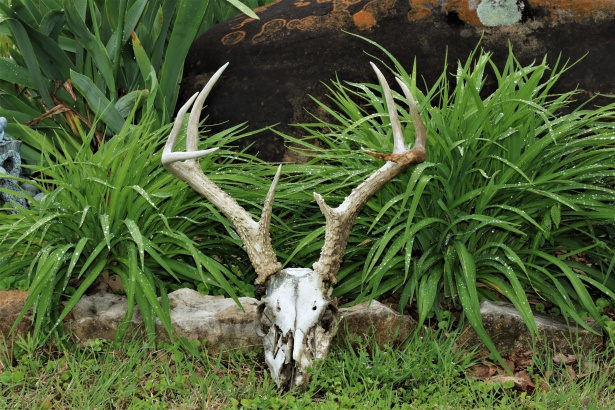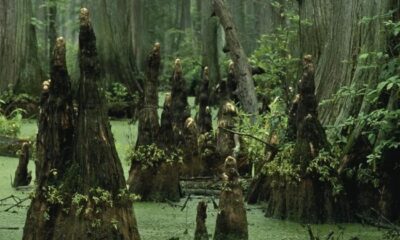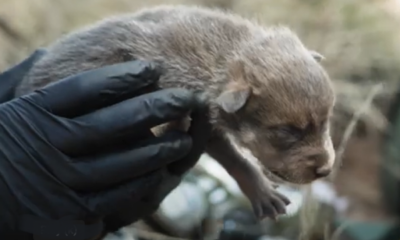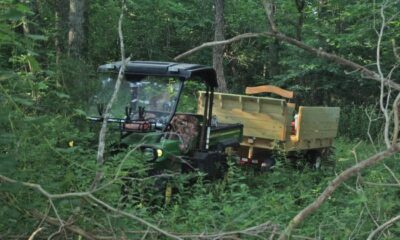Adventure
How to Keep Deer Out of Your Garden

Step 1: Leave the skulls of previous trespassers to serve as a warning.
Yes, yes, they are very cute … until they’ve eaten every scrap of green in our garden, that is.
If you’ve joined the great COVID-19 exodus from the cities, chances are you’ve looked around at your acreage and thought that it would be nice to have a garden. Whether you’re trying to get a homestead going or just hoping for some fresh salad ingredients, gardening is one of the great unsung joys of rural life. Another great unsung joy of rural life is waking up one fine morning to discover that your hard-won fruits and veggies are currently becoming deer poop. Whether you want to keep the deer from eating all your garden vegetables and flowers or whether you’re interested in ways to help wildlife this summer, here are a few things you should know.
How to reduce conflicts with deer in your garden
In order to find alternate food sources, deer and other big game animals may end up in people’s yards or gardens this summer. If you want to try to save your plants and want to minimize any property damage from these wildlife visits, here are a few tips:
- Building an 8-foot fence around your garden or yard is the most effective method, and is probably the only reliable way to keep deer out of your garden.
- Another fairly effective technique is to install a motion-activated sprinkler.
- People can also try planting unpalatable vegetation around the perimeter of their gardens to deter deer from eating additional plants.
How to help wildlife during a drought
While some people may want to prevent deer and other wildlife from eating their lawns or gardens, others may be looking for ways they can help hungry and thirsty animals this summer. Biologists warn against doing so.
“The best way you can help wildlife is by letting animals stay wild,” Utah Division of Wildlife Resources Wildlife Section Chief Justin Shannon said. “Don’t approach them, and don’t try to feed them. These animals have evolved to be able to survive numerous weather conditions and to make it on their own. Often people’s good intentions wind up doing more harm than good for the wildlife. Not to mention, it can be really dangerous when deer, moose or bears become habituated and lose their fear of people.”
All that said, there are things you can do to help improve the health of your local herd. If you notice deer or elk that look sickly, are injured or are acting aggressively, you should report it to the nearest DWR office. If you encounter a cougar that has killed something in a neighborhood or yard — or it is exhibiting aggressive or threatening behavior — you should report it. If you see a bear in a residential area within the foothills or canyons, they should only be reported if they are being aggressive or if they are getting into trash, fruit trees or causing damage. You should report a bear that has wandered into lower-elevation areas and is within city limits or in a heavily-populated area.
-

 Hunting2 months ago
Hunting2 months agoDrain the Swamp: Corruption Scandal at Washington State’s Fish & Wildlife
-

 Adventure3 weeks ago
Adventure3 weeks agoDoes the “Big Beautiful Bill” Have a Public-Lands Wart?
-

 Adventure1 month ago
Adventure1 month agoHowling in Cuckoo: How Mexican Wolves are Fostered
-

 Gear1 week ago
Gear1 week agoLet Freedom RING! Primary Arms’ Independence Day Category Sale Starts NOW
-

 Adventure3 days ago
Adventure3 days agoREACTION: Trump’s Make America Beautiful Again Agenda
-

 Adventure2 weeks ago
Adventure2 weeks agoU.S. Bighorn Sheep Going Home to Canada
-

 Adventure2 months ago
Adventure2 months agoGoing Rodeo! BANISH Named the Professional Rodeo Cowboys’ Official Suppressor
-

 Adventure1 month ago
Adventure1 month agoYour Dream Hunt Could Be a Movie & Leupold Can Help


